Sorry, we don’t have any Beretta models left in stock. LOL!
How about a sleek and sporty Malibu? Or maybe an Equinox instead?
Call our Customer Care Team today at 630-898-9630 for an updated list of the Chevrolet model line-up.
Insights, Tips & More For Your Chevrolet Vehicle
Sorry, we don’t have any Beretta models left in stock. LOL!
How about a sleek and sporty Malibu? Or maybe an Equinox instead?
Call our Customer Care Team today at 630-898-9630 for an updated list of the Chevrolet model line-up.
What can you and your Owner Center do?
Service History
A comprehensive service history allows you to get the most out of your vehicle — while you’re driving it and at resale. By creating an account, you can:
Warranty
Need to know if your vehicle is still eligible for warranty coverage? View your vehicle’s warranty status to stay informed about its warranty coverage.
If your vehicle and its VIN are already saved in the GM Owner Center, you can access your vehicle’s specific warranty information whenever you need.
If a recall has been issued for your GM vehicle, including Chevrolet, Buick, GMC, Cadillac, Pontiac, Oldsmobile, Saturn, HUMMER or SAAB, find it here. GM provides information on this website for recalls announced on or after August 20, 1999. This information is available for vehicles in which repairs have not been completed.
Every month, we can give you an automatic check of your vehicle and send you a diagnostics report.1 You can view this information—and much more—on the Vehicle Diagnostics section of your Owner Center, but only if you log in and link your Connected Services account.
1 Capabilities vary by model and service plan. Visit onstar.com for details and system limitations. Message and data rates may apply. Requires active service, email address on file and enrollment in Vehicle Diagnostics. Not all issues will deliver alerts. On-Demand Diagnostics requires a paid service plan.
Plus you can view owner’s manuals and how to videos!
Thanks for reading about GM’s Owner Center explained. If you have additional questions please call our Customer Care Team at 630-898-9630.
With the Honda Passport and Nissan Murano giving it strong competition, the Chevrolet Blazer puts forth the strongest argument to consider a Chevy SUV in years.
 Shop New Chevy Blazers on our website now!
Shop New Chevy Blazers on our website now!
The differences between the Blazer and the Trax, Equinox, Traverse, Suburban, and Tahoe start at the vehicle’s nose and continue to its tail. The Blazer’s narrow, squinty headlamps and grille are reminiscent of the Camaro, drawing your eyes to the edges of the SUV, which has a wide and beefy stance.
Call our Customer Care Team at 630-898-9630 now for the best offers on new Chevrolet Blazers!
With its very vibrant Red Hot paint job, the Blazer RS borrowed as a tester is a magnet for second looks, including some from the local authorities. Its shiny 21-inch gloss black wheels replaced the standard 20-inch “Dark Android” machined-face aluminum wheels as part of an options package. They played well off the red, combining with black badging and roof rails for a thoroughly modern, Mark Rothko art-like appearance.
For as much effort as was put into making the Blazer fierce up front, there’s little to show from the effort at the rear. There, it takes on a rather generic appearance that plays into the design aesthetic of the Equinox and Traverse. It’s a shame.
The Blazer RS trim is powered by a 3.6-liter V6 engine that is paired with a nine-speed automatic transmission. It achieves 308 horsepower and 270 pound-feet of torque that make it feel rather zippy compared to the average SUV. The SUV’s acceleration is more satisfying in this configuration than the drive experience in the Murano and Passport.
 This engine comes with either the front- or all-wheel drivetrain. As tested, the Blazer RS all-wheel drive which helped it stick to the road well with much less body sway than the Murano delivers. Despite handling well, the Blazer’s drive experience isn’t as sporty as the Acura RDX but is a step up from the Murano and Passport.
This engine comes with either the front- or all-wheel drivetrain. As tested, the Blazer RS all-wheel drive which helped it stick to the road well with much less body sway than the Murano delivers. Despite handling well, the Blazer’s drive experience isn’t as sporty as the Acura RDX but is a step up from the Murano and Passport.
A 2.5-liter four-cylinder power plant is standard on the Blazer but is only available on the base L and Blazer 2.5 Cloth grades. It achieves 193 horsepower and 188 pound-feet of torque. The smaller engine is, unsurprisingly, more fuel efficient than its 3.6-liter counterpart, though not by much, getting 22/27 mpg city/highway.
The Blazer’s cabin is filled with modern design elements that are unlike everything else in the Chevy lineup (in a very good way) including the circular air vents with climate controls on their exterior rings. Small buttons for other controls, like airflow and heated seats, string across the center stack below the standard 8-inch touch screen display emphasizing how spacious the SUV’s cabin is.
The infotainment touch screen is more solidly anchored to the dashboard than it is in other GM SUV’s, where is seemingly floats in a Mazda-like manner. Behind that screen is a not-so-secret-anymore storage compartment.
The centrally-located air vents do a good job circulating air throughout the cabin and are easy to maneuver. Despite their low positioning, they keep the heat from the sun pouring through the windscreen at bay.
Unlike in other Chevy SUVs, the Blazer isn’t rich with an abundance of cabin materials. Its interior is filled with a solid selection that are similar in quality to what you’ll find in the Passport and Murano. The Chevrolet tester had good fit and finish.
 Chevrolet, a division of General Motors Co. (NYSE: GM), has installed comfortable seating for adults in both rows of the Blazer. Unless you’re especially tall, you won’t have a problem being comfortable in the back seat.
Chevrolet, a division of General Motors Co. (NYSE: GM), has installed comfortable seating for adults in both rows of the Blazer. Unless you’re especially tall, you won’t have a problem being comfortable in the back seat.
Cargo space is perfectly fine as well. As a midsize SUV, its short on cargo space, but the average daily driver likely won’t notice that it falls behind its closest competitors and it shouldn’t be a deciding factor for Blazer shoppers.
 The Blazer RS tester came equipped with a cargo management system had a moveable rail that locks into place at various points throughout the cabin. The idea is good in theory, but the rail is flimsy and, in the tester Blazer, it rattled frequently. Still, it can easily hold a group of grocery bags or a few potted plants in place for the ride home. If the rail wasn’t there, the floor well of the back seat would have worked just as well for storage.
The Blazer RS tester came equipped with a cargo management system had a moveable rail that locks into place at various points throughout the cabin. The idea is good in theory, but the rail is flimsy and, in the tester Blazer, it rattled frequently. Still, it can easily hold a group of grocery bags or a few potted plants in place for the ride home. If the rail wasn’t there, the floor well of the back seat would have worked just as well for storage.
The Blazer starts just over $29,000 but the Blazer RS (which isn’t a top-tier model) has a starting MSRP of $43,500. For that price isn’t not a bad deal. However, for the features buyers will want like adaptive cruise control, a sunroof, wireless charging pad, forward collision alert, a power tilting and telescoping wheel, heated rear outboard seats, and lane keep assist, customers have to add on over $6,000 in options packaging bringing the total cost up to over $50,000 when the $1,195 destination and delivery charge is added in.
Buyers can get a top of the line Passport or Murano for thousands less. The three-row Subaru Ascent in its most premium build is also less than the Blazer RS with those options packages.
If you’re in the market for a zippy two-row SUV with a high-tech premium interior, and don’t mind spending around $50,000, you should cross-shop the RDX, which has also been redesigned for the 2019 model year and delivers a more engaging drive experience than the Blazer, combined with equally aggressive styling.
Still, the Blazer makes a compelling argument to be the two-row SUV for empty nesters. Its interior shows what Chevrolet can do, and hopefully what they will do in the future.
Since its inception, the Chevrolet Corvette—in production form, at least—has never deviated from three core attributes: front engine, rear-wheel drive, fiberglass bodywork. From its 1953 debut with the Blue Flame inline six-cylinder to the thundering 755-hp 2019 Corvette ZR1, the basic formula has been set in stone.
Want a new mid engined Corvette? Call our Customer Care Team now at 630-898-9630. Or, visit our website at http://www.WestphalChevy.com.
That all changes now. Chevy is officially moving the engine to the middle, behind the passenger seats.
With this move, Chevrolet is shooting a flare into international waters, putting on notice the major players in the mid-engine-performance space including the Ferrari 488, Lamborghini Huracán, and Audi R8 as well as its crosstown rival, the Ford GT, and letting them know that the General can still cut and run when the accountants provide a long enough leash.
So what does “mid-engined” mean? Technically, it means that a car’s engine is located in the middle of the vehicle, somewhere between the front and rear axles. But the typical location in a sports car or supercar is behind the driver and in front of the rear axle.
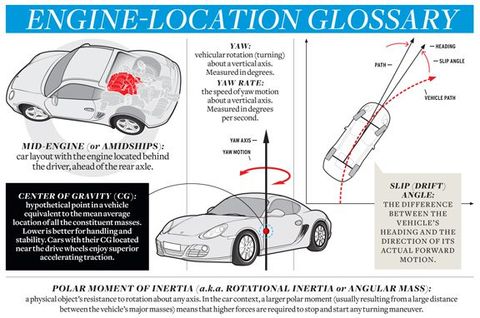
Engine placement matters for many reasons when it comes to high-performance cars, but mainly it’s all about braking and handling. Shifting the engine rearward puts more weight on the rear axle, which means more rear-end traction and the ability to put down more power and accelerate more quickly. A mid-engine layout also improves braking, because the additional weight lets the rear brakes do more of the stopping. Mid-engined cars have a lower polar moment of inertia, which is a technical term that means that the mass of a mid-engined car is more centralized in the vehicle. This allows the car to change direction more easily and therefore more rapidly. (To experience this phenomenon, get someone to spin you in an office chair and compare the speed you feel with your legs fully extended versus tucked in.) The downside is that, should the rear end break loose and swing wide at speed, it’s much harder for a novice driver to recover.
Aside from performance, a mid-engined car looks different because of not having to package an engine up front. It can have a much steeper hoodline and improved forward visibility. The proportions of a mid-engined car can give it an exotic look—but then, the short list of mid-engined vehicles is made up of one exceptional name after another.
It’s not that GM hasn’t kicked around the mid-engine layout before; the company’s archives are filled with drawings and concepts utilizing the engine-behind-the-driver layout. But its realization in the 2020 Corvette validates the efforts and fulfills the promises made by in-house Corvette gurus such as Bill Mitchell, Larry Shinoda, Pete Brock, Zora Arkus-Duntov, and Tadge Juechter, both now and back in the day when automobiles were an agent of progress and the future seemed limitless. Critically, it also serves as a rolling indicator that GM still has a pulse and wishes to wring every last drop of potential and excitement from the automobile as we currently know it. In changing times, that’s the kind of reassurance we need.
Want to know more about mid engined Corvettes? You may also enjoy this article: http://westphalchevyblog.com/index.php/2018/05/17/mid-engined-corvette/
For more view source: https://www.caranddriver.com/news/a27128435/mid-engined-corvette-why-it-matters/
A Corvette this different deserves a symbol all its own. …
A Corvette this different deserves a symbol all its own. Keep up with it here: https://s.chevy.com/an9zh
Posted by Corvette on Friday, April 26, 2019
Chevrolet’s halo cars have been graced with their own emblems since the very first Polo White convertible rolled off the line in June of 1953, and the automaker put out a neat animation showing how they’ve changed over the decades.
The 2020 Chevrolet Corvette will bring changes big and small to the iconic Americn performance nameplate. Chevy finally owned the worst-kept secret in automotive history when it confirmed the C8 ‘Vette’s mid-engined migration earlier this year, and today it’s showing off the next generation of the Corvette’s historically unique logo.
Compared to the outgoing, front-engined C7, the C8 logo adds a sharper pitch to the V-shaped design by removing the notch at the bottom and pressing the two branches closer together. There are a few other changes—the pattern on the checkered flag is reversed and darkened, there’s no longer a small line beneath the fleur-de-lis, and the Chevrolet logo is outlined in black rather than silver—but it’s a decidedly cautious update compared to what GM is doing with the new Corvette powertrain.
What started as friendly pair of interlocking flags—one checkered, one bearing the Chevy cross and a fleur-de-lis to honor company founder Louis Chevrolet—has since evolved into a more abstract, angular semaphore leaning heavily into the current car’s high-performance aspirations. This latest version looks to further that image with its raked-back style.

On the morning of April 23rd, Ron Westphal Chevrolet General Manager, Bill Houlis, was driving to work like usual. Suddenly, he spotted a puppy jetting out from the field into the road directly in front of the new Chevrolet Tahoe he was driving. Bill got out of his vehicle and looked around, hoping to see the dog’s owner chasing after him. No such luck. No one was around and the little pup was begging for Bill’s attention, so what could he do? He scooped up the little guy and plopped him into the passenger seat of the Tahoe and took him to work.
 Everyone at Ron Westphal Chevrolet was immediately charmed by this friendly, squiggly puppy. Erin Bonifas, our license and title clerk called her sister in law who brought over dog food and a lease. We are all dog lovers in the Ron Westphal Chevrolet office so we already had dog bowls, treats and toys on hand for the doggie visitors our clients bring in. These canine accessories came in especially handy today.
Everyone at Ron Westphal Chevrolet was immediately charmed by this friendly, squiggly puppy. Erin Bonifas, our license and title clerk called her sister in law who brought over dog food and a lease. We are all dog lovers in the Ron Westphal Chevrolet office so we already had dog bowls, treats and toys on hand for the doggie visitors our clients bring in. These canine accessories came in especially handy today.
When our IT gal came in she immediately posted the little pupper’s pic all over the Internet. The little guy received tons of shares and comments but no one has claimed him as of yet.

Bill Houlis and our Internet Manager, Mike Kalsto, took the dog across the street to the Oswego Veterinary clinic to see if he was microchipped and to have his overall health accessed. As it turns out, this puppy was chipped, but not registered. We’ll do our best to track down the owners but, in the unlikely event the original owners aren’t found…I can assure you we’ll find a wonderful home for ‘Sam’, our temporary official mascot at Ron Westphal Chevrolet.
UPDATE: RENUNITED WITH OWNERS!
As it turns out this little pup was chipped but not registered to an owner. But, Bill Houlis was able to track down the chip to a facility in Florida that had received 2 dogs from the Cayman Islands. Working with the Cayman Islands and the Florida facility we were able to track down the owner. So this sweet puppy who’s real name is Cayman, and he’s back with his sister pup and a family of 4 kids in a safe, fenced-in back yard.
Thanks to everyone who followed this story on our facebook page. We got over 600 shares that reached over 32,000 folks. We appreciate everyone’s thoughts and suggestions!
The insurance-funded IIHS consistently pushes the bar higher for automakers to make safer vehicles, and this year, it’s begun to test automatic emergency braking systems.
The first round of tests included 11 popular compact crossover models, and the Chevrolet Equinox impressed. The new tests come as the IIHS places an emphasis on pedestrian safety and includes a relatively simple scale. From best to worst, vehicles can be ranked “Superior,” “Advanced,” “Basic,” or receive no credit.
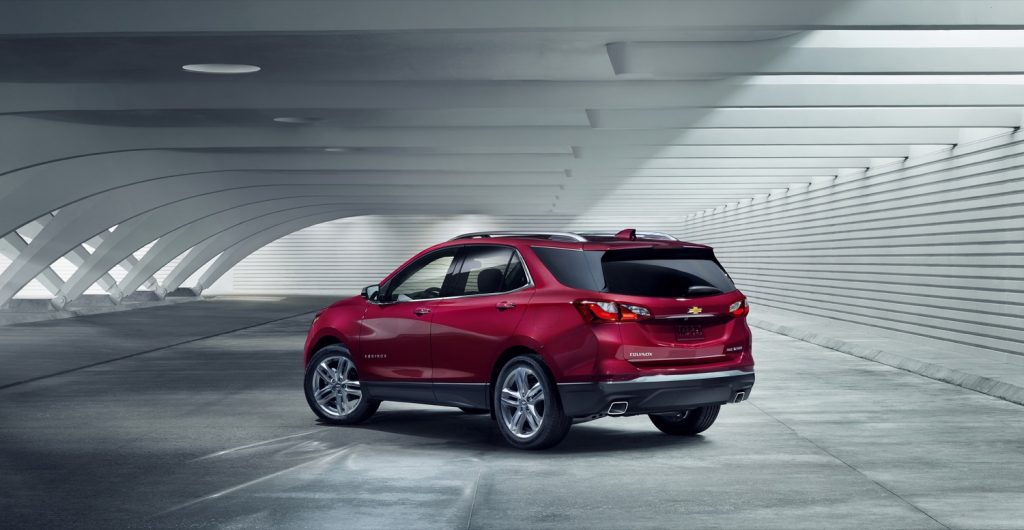
The organization rated the Chevrolet Equinox as “Advanced” with its optional automatic emergency braking system. Recall, GM does not make automatic emergency braking standard on any vehicle, save for the forthcoming 2020 Cadillac XT6. Even then, a more robust system is optional for buyers.
Shop Chevrolet Equinox at Ron Westphal Chevrolet.
Chevy’s Equinox joined four other crossovers in earning an “Advanced” rating, which included the Hyundai Kona, Kia Sportage, Mazda CX-5, and Nissan Rogue. Top honors went to the Honda CR-V, Subaru Forester, Toyota RAV-4, and Volvo XC40. The Mitsubishi Outlander earned a “Basic” rating, while the BMW X1 earned no credit.
We encourage you to watch the video above to see how spectacularly BMW failed the test.
The IIHS testing looks at three possible scenarios where automatic emergency braking could help mitigate or even prevent a collision with a pedestrian. The first is an adult pedestrian on the right side of the road entering the street in the path of an oncoming vehicle. The second mimics a child darting into the street from behind two parked vehicles. The third simulates an adult walking in the vehicle’s travel lane near the edge of the road. Here, the pedestrian has his or her back turned away from the cars.
In the safety shakedown, only the Forester and RAV4 avoided the crash dummy in perpendicular tests, which underscores their underlying safety systems.
Thanks for reading about BMW Fails.
A 1977 Chevrolet Nova driven by Dale Earnhardt in the NASCAR Busch Series will soon be auctioned off by Barrett-Jackson at its Palm Beach 2019 sale.
Can’t quite afford a retired NASCAR? How about a new Camaro?
This well-preserved piece of General Motors racing history was originally built by famed NASCAR fabricator (and Earnhardt’s brother-in-law) Robert Gee Jr. Earnhardt. He drove the car in the initial race after the NASCAR Late Model Sportsman Series was rebranded as the Busch Series in 1986, winning the series’ first race at Daytona that year. According to Barrett-Jackson, this chassis also took wins at Richmond, Darlington, and Rockingham.
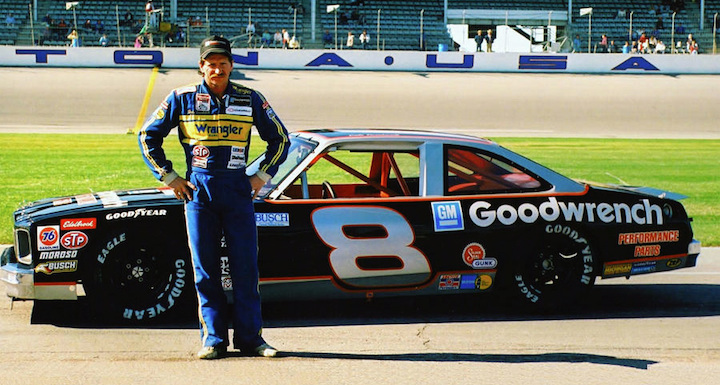
Interestingly, this car started out life as Dale’s Wrangler Jeans-sponsored Pontiac Ventura, but Gee converted the car to a Nova due to the Chevy’s superior aerodynamic properties. It has a NASCAR-spec 358 V8 under the hood, which is making around 700 horsepower, along with a four-speed manual transmission. The car is presented in “good running and driving condition,” but the seller suggests having it looked over professionally before the new owner does any vintage racing with it, as it has sat in a private collection for a number of years now.
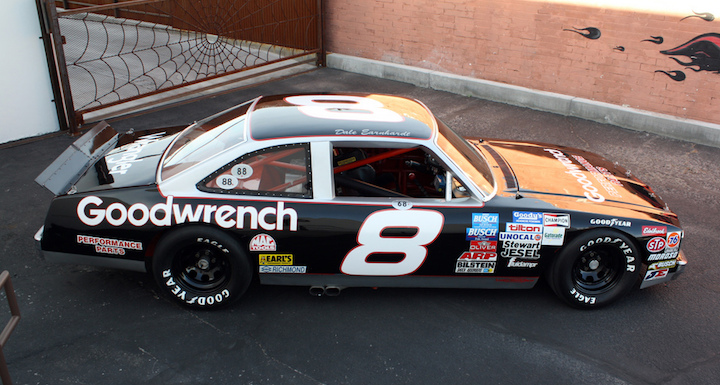
This car has made a number of public appearances in recent years. It participated in the Goodwood Festival of Speed in England three separate times (2005, 2006 and 2009) and participated in the 2012 Rolex Monterey Sports Reunion. It was also shown at the 2014 Concours d’ Elegance at St. Johns in Michigan.
It’s hard to say what this Dale Earnhardt-driven 1977 Chevrolet Nova is worth. Barrett-Jackson didn’t provide an estimate and it’s also being offered without reserve.
Check out the listing at this link for additional information and photos.
Photos via Barrett-Jackson
Source: Barrett-Jackson
Read more: http://gmauthority.com/blog/2019/04/ex-dale-earnhardt-1977-chevrolet-nova-nascar-goes-up-for-sale/#ixzz5koHOzdpy
MINT 2015 Chevrolet COPO Camaro for sale
Just in case you don’t have over $100,000 to invest in this high-performance Camaro, we have a nice selection of new and pre-owned Camaro models in stock. Call our Customer Care Team to verify inventory.
Ron Westphal is upping the bar by adding an additional discount to all Chevrolet models. Check out our Malibu models with discounts as high as 22.79% off MSRP on stock # N19080. That’s $7,912 off a car with a sticker price of $34,720. Call our Customer Care Team at 630-898-9630 for details. Search Inventory
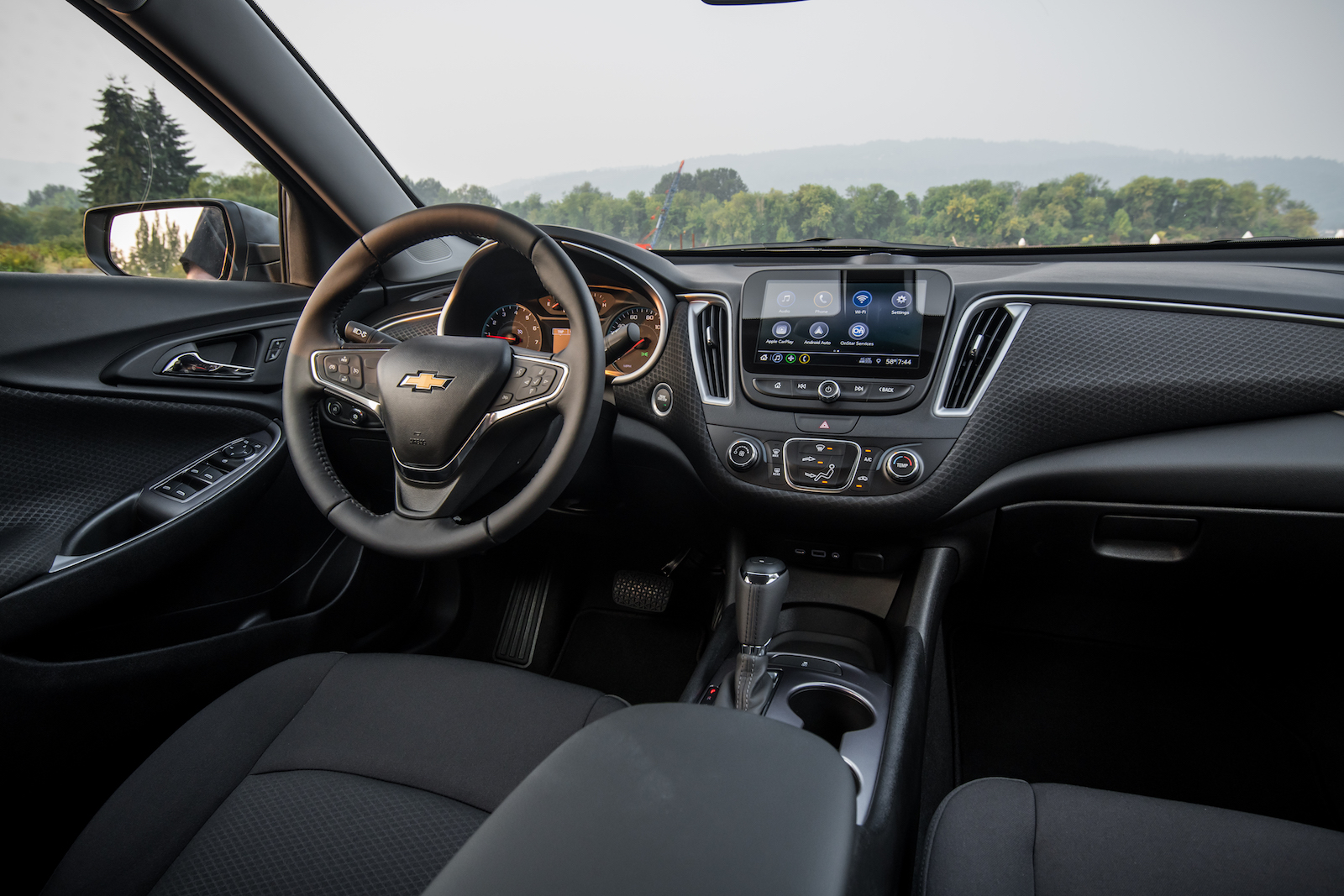
Nationwide Chevrolet discounts on the Malibu are as follows:
The 19 percent Chevrolet discount is restricted to current competitive owners, and is smaller than the discount offered in March.
It’s also worth noting that the 18 percent below MSRP and the $2,500 discount on 2018 Malibu models is likely intended to clear out remaining inventory of pre-facelift, 2018 models.

For reference, here are the starting MSRPs for the 2018 Malibu and 2019 Malibu:
2018 Malibu:
2019 Malibu:
What’s more, the 19 percent incentive for the 2019 Malibu only applies to owners of competitive vehicles. As such, it’s clearly a strategic approach by Chevrolet to gain conquest sales.